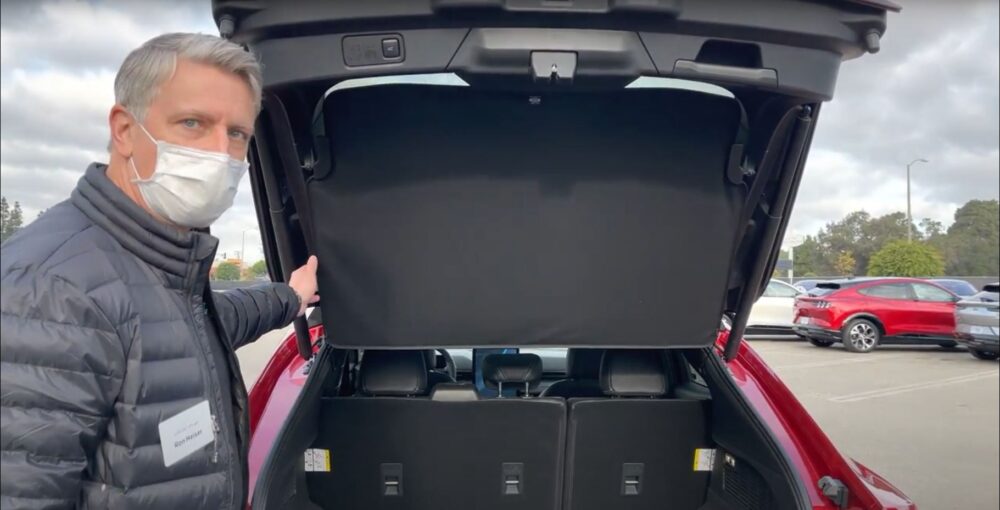Mustang Mach-E: Electric Pony Boogaloo for the Futurist
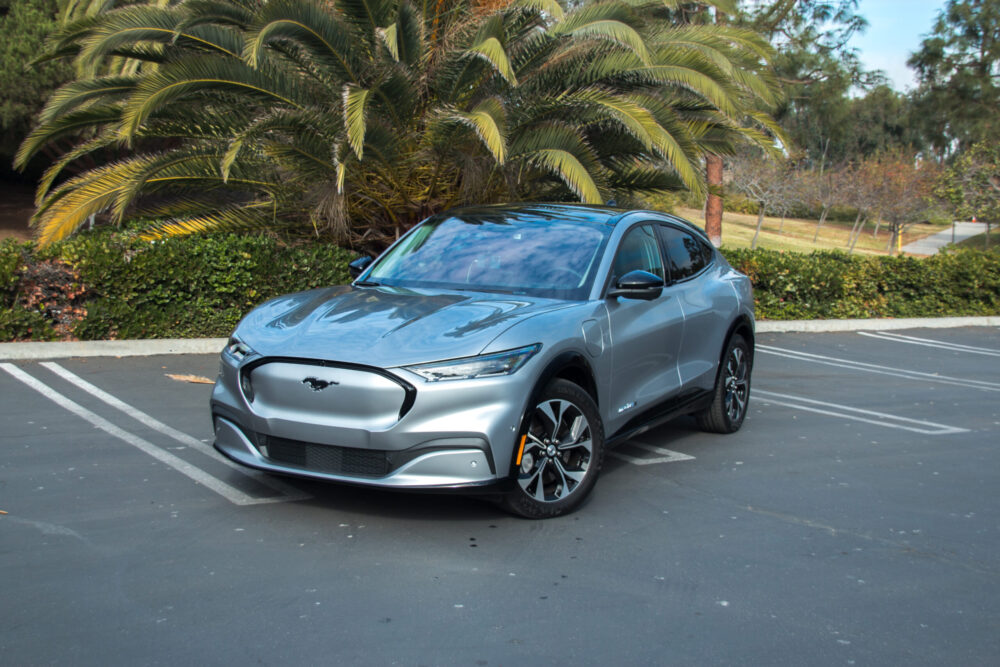
Ford’s specialty family-hauler Mustang Mach E trades pistons for watts, and it’s a lot more fun than you think.
When most people think of a Mustang, they think of the icon, the legend, the car that started the pony wars, and ultimately dominate the first era of American Muscle. So it’s not hard to understand why so many lifelong (and even casual) enthusiasts write-off or otherwise bash the idea of “Mustang SUV” outright when the rumblings and rumors first of the Mach E entered the arena years ago.
IB Automotive Editor Michael Palmer and I were invited to Ford’s Mach-E Drive Event at The Forum (nee Great Western Forum) in Inglewood, California, and while it seems bizarre, the Mach E really is a capable crossover for those looking utility, performance and eco-conscious design.
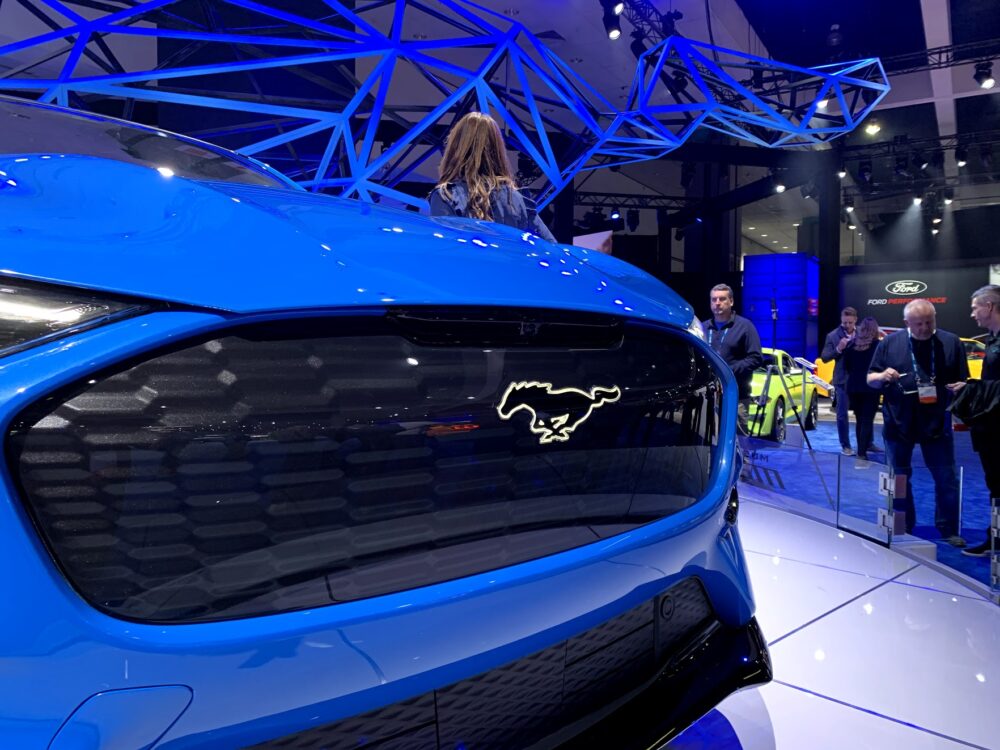
Originally teased as a “Mach 1” successor, we’ve officially known about the Mach-E since early 2018. And since then, it has single-handedly divided the Mustang cult in half—for obvious reasons. Back then, you’d have been forgiven for thinking that Ford was dead serious on reviving the Mach 1 Mustang in a massively non-traditional way (only, it was a ruse).
However, performance enthusiasts a vehicle based on speed, power, handling, and ultimately the thrill of it all, before we consider anything else. Generally speaking, Mustangs handedly check off all those boxes, and the Mach-E seems no different.
Let’s talk about it.
Mach E Exterior
At first glance, I can’t help but feel like the Mach E looks—bland. Even with iconic “fastback” design cues and tri-bar tail lights, it doesn’t have that “wow” factor when you look happen across it a random parking lot. For what it’s worth, that’s for no fault of its own, after all the crossover design is just naturally cookie-cutter.
Looking at it more closely, the pony car elements greatly help the body lines. The dash-to-axle body lines extend rather far for a crossover, giving it that Mustang-like appearance in the front.
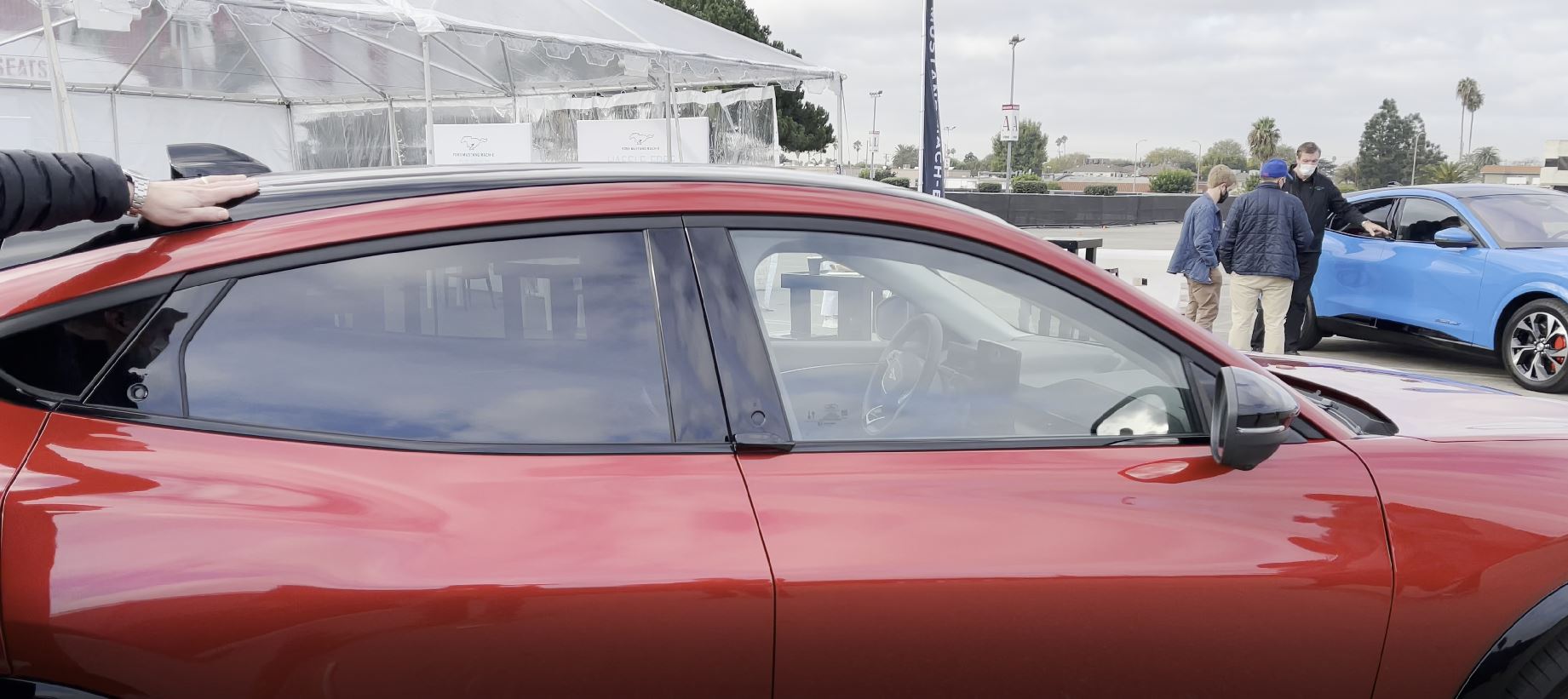
“We really wanted to carry a fastback-type of graphic on rear, but we know that utility vehicles that have that type of design generally lose a lot of headroom, and we did not want that,” said Ron Heiser, Chief Engineer for the Mach E. “We spent a lot of time working on roof system, and we probably have the most complex roof stitch molding in the industry right now.”
Moving your eyes onto the rear, you’d think that’s where the pinch point for headroom is, but it’s actually quite deceiving. “This is where all that headroom is, but you don’t read that line like a ‘fastback’ design,” said Heiser.
Personally speaking, the overall design of the vehicle lies somewhere between svelte and robust.
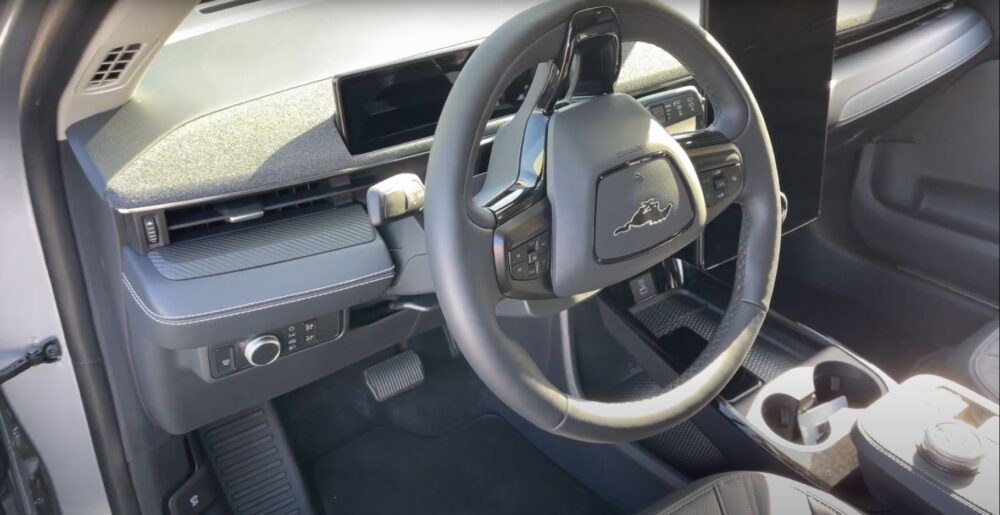
Interior & Features
We got to try two different variants of the Premium trim, one rear-wheel-drive and the other AWD. The RWD Mach E was the Standard Range model (266 horsepower, 317 TQ), which is what we used for the road course portion of the event, and the AWD was an Extended Range 4 X (349 HP, 428 TQ) for the street. We’ll talk about both of those experiences later.
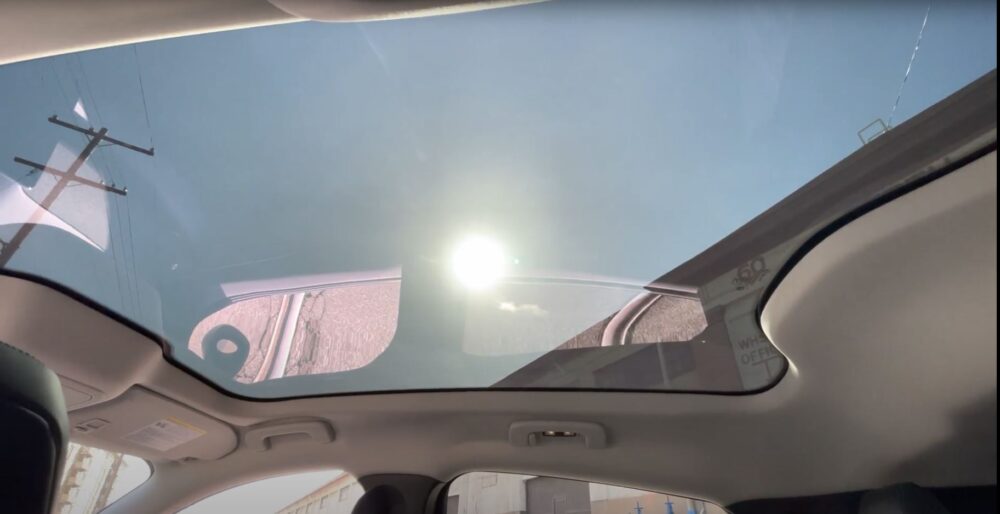
Both models came with a glass panel roof (standard is body colored), which makes the Mach E feel like it earns the “Premium” moniker. Other than that, they both have vertically-oriented infotainment systems that add that EV feel inside the cabin. Lo, the UX on the software needs a little improvement (i.e. cluttered interface, dead zone issues, navigating through the menu), but overall the screen has a wonderful refresh rate, looks incredibly sharp and the animations are very smooth.
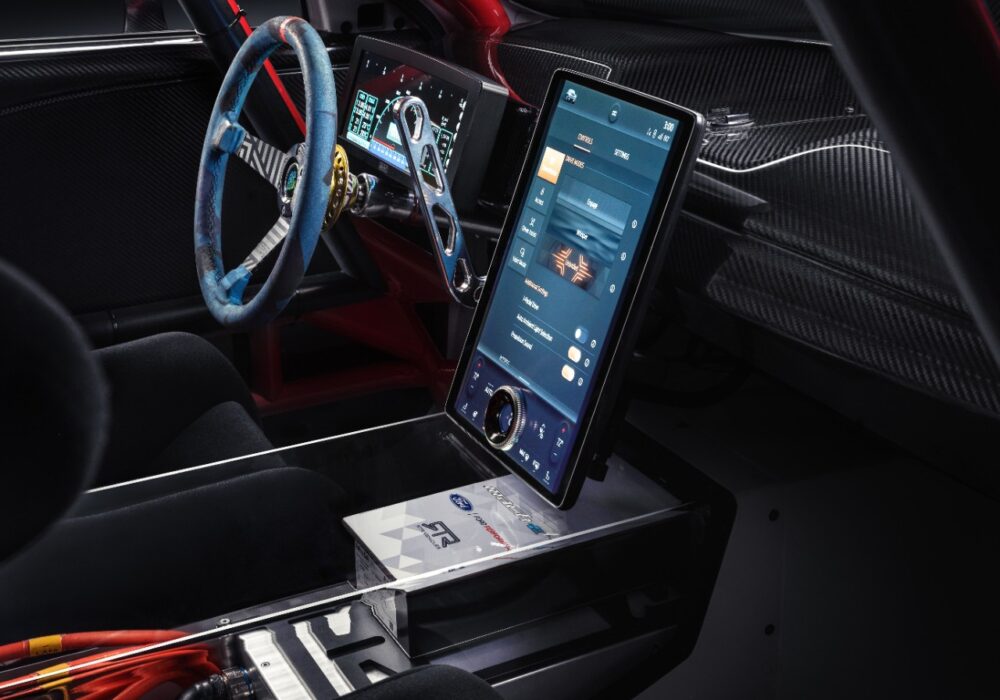
Ford
Better still is the physical/digital hybrid volume knob and power button. Volume controls are one of the few features in life that are always better with tactility, and Ford understands this. The Sync 4 infotainment system in the Mach E uses a physically-mounted volume knob/power button combo onto the display. It works by simply making contact in the areas where fingers would normally press a digital button on the screen, making the best of both worlds.
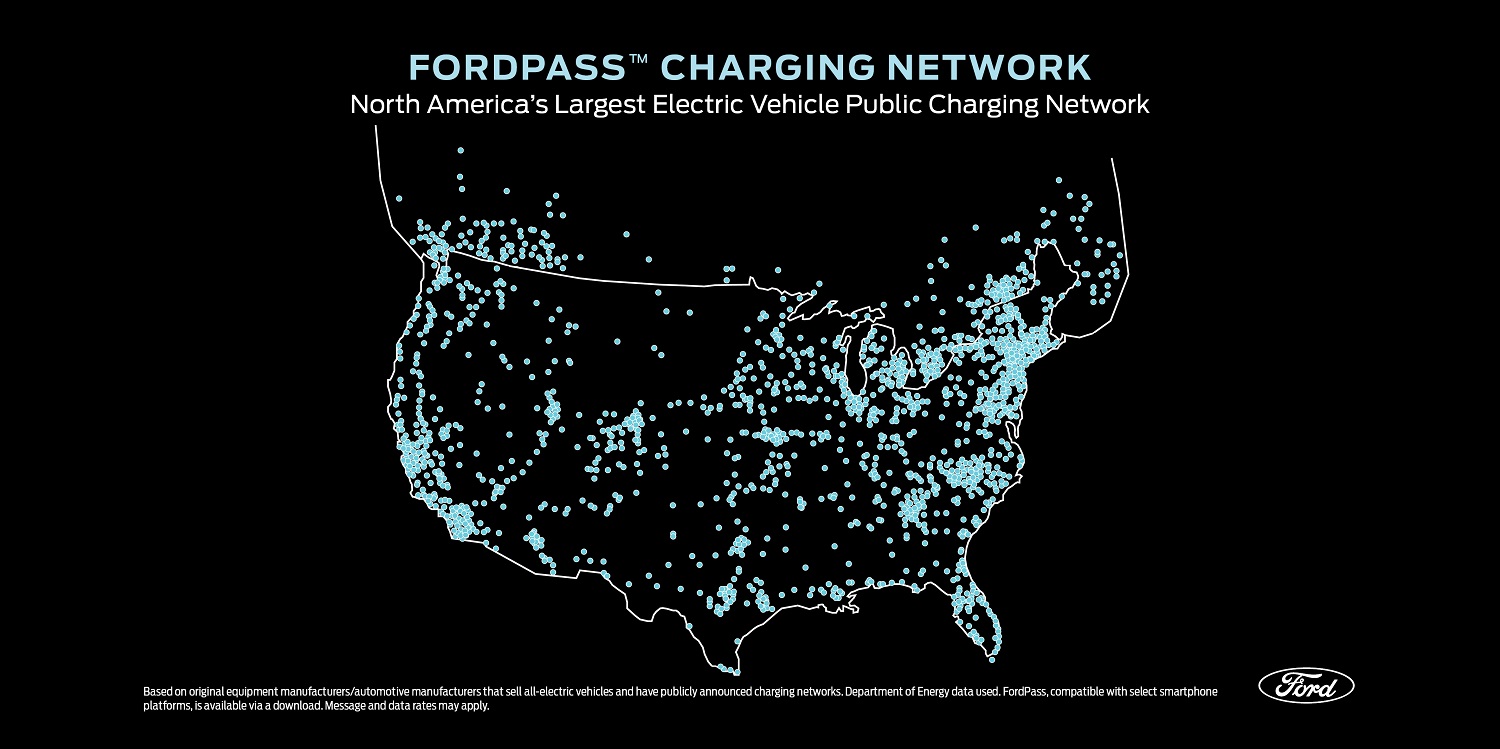
Being in EV Central (aka, California), the FordPass Charging Network gives Mach E owners peace of mind when commuting. Through the app, you can see exactly where charging stations are based on GPS, and their rates. You can also plan your trips through the app by creating routes with charging stations as plot points (stops). Since Ford essentially partners with these stations, you can pay-as-you-drive with your FordPass account.

‘Phone as a Key’
Probably my most coveted feature, being able to use your phone as a key (via FordPass app) reminds me of the old days at the Consumer Electronic Show (CES) 2015, where we first saw this functionality. We were teased for years until BMW and other Euro automakers finally implemented it.
What’s really cool about the Mach-E’s mobile key solution is that you can precondition your battery in colder conditions within the app. Before you ever even get in the vehicle. Think of it as a “digital” engine block heater–only there’s no engine, only electric motors.
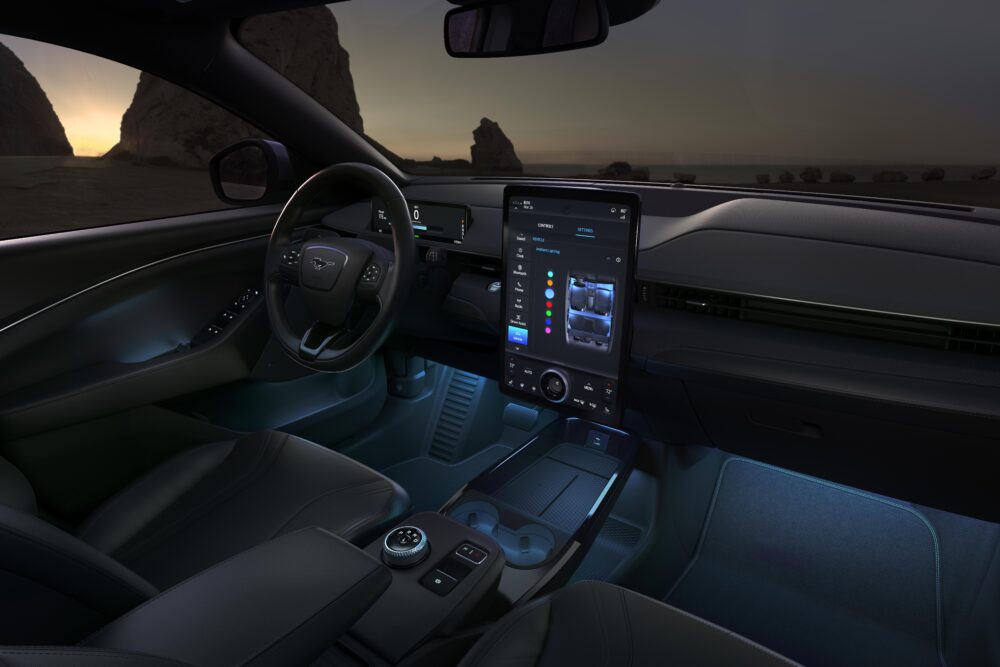
Ford
Seats & Comfort
The Mach E seats are surprisingly comfy. I say this because as you know, Mustangs typically don’t have the most ergonomically-robust OEM seats. And since this is a “Mustang,” the added comfort is not only welcome but warranted.
Consequently, the quality is not up to par with, say, a GT or PP1 GT, and they perhaps need a bit more bolstering with the way the Mach E handles. However, the biggest letdown is the lack of ventilated seats. You can warm them up, but as it stands on the Premium trim, you can’t cool them. Bummer.
Cabin Space
On a more positive note, the Mach E has tons of room. One of the staff present at the event, Darren Palmer, Global Product Development Director for Ford, stands 6-foot-6-inches, yet has no problems with ingress/egress. We can’t imagine he’d have the same kind of luck in other crossovers.
You’ve got 30 cubic feet behind the second row of seats, and just under 60 cubic feet in the front row.
“For reference, it has roughly as much cubic feet volume as a Porsche Macan,” said Mark Kaufman, Global Director, Electrification at Ford Motor Company.
The RWD Standard Range was more than capable of handling all the sharp banks and the slalom. It has incredible stopping power (despite having rather touchy brakes) at multiple speed ranges. The steering feels tight and connected where it needs to be on both models. However, the AWD version on the highways and streets is truly a force to be reckoned with with all that giddy-up and grip.
Enough about the function. Time to get to fun stuff.

